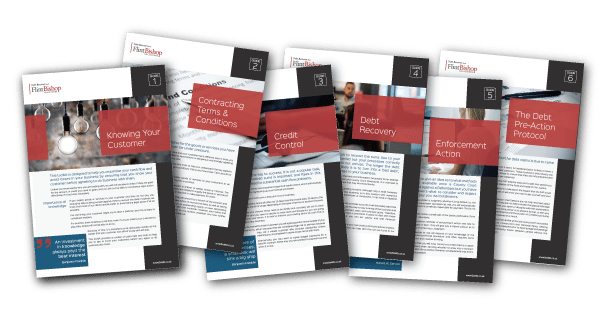Your credit control and debt recovery operations are often seen as is an expensive cost centre. However, they can, with the right approach, be at least cost neutral and can even be a profit centre. This article will look at a few things you can do, with the help of solicitors to reduce the overall cost of your credit control and debt recovery, therefore save costs on debt recovery.
Maximise your returns
Your terms and conditions can be very important in attempting to recover your debts. We often find that many organisations require a specified interest rate be paid on all unpaid invoices. This is usually in the region of 4-5% of the invoice value. However, by simply claiming interest pursuant to the Late Payment of Commercial Debt (Interest) Act 1998, you will be entitled to interest at 8% above base rate (currently a total of 8.25%) on all invoices that become overdue. Interest will accrue at a daily rate until payment is received, or Judgment is obtained.
It is not necessary to have a clause in your terms and conditions providing that the act will apply, as you can claim under this act as long as you have supplied goods and services under a business transaction (not a consumer agreement). It is, however, good practice to have such a clause in your terms and conditions, as it reduces any dispute that a debtor may have about paying the interest.
With a base rate of 0.25% currently, you won’t find many banks paying you an interest rate of 8.25% on your money, so this can provide a nice opportunity to make a few extra £s out of an otherwise frustrating overdue debt.
Cover your administrative costs
As a way of recognising the administration costs involved in chasing recovering an overdue debt, The Late Payment of Commercial Debt (Interest) Act 1998 also provides that compensation costs are payable on each outstanding invoice (as well as interest) on a sliding scale:

Simply by incorporating the Late Payment of Commercial Debt (Interest) Act 1998 into your terms and conditions, or claiming under the Act, you will be able to charge in line with the above on all invoices that become overdue, right from the outset of your credit control process. This will increase the amount of money recoverable from debtors, thereby covering some if not all of your administration costs.
This can be an important tool, particularly for businesses that involve regular small orders and invoices. Like any issue involving overdue debts, you will always have to consider the balance between maximising your recovered cost and your business relationships. However, the knowledge that these costs are recoverable could just persuade a regular slow payer to put you at the front of the queue next time, in which case you avoid the administrative costs completely.
Another way in which your terms and conditions can help is to include a clause providing for further admin fees and/or legal fees to be paid by the debtor in the recovery of debt. A well-drafted clause in your terms and conditions, for example, stating that if you instruct an external debt recovery partner then you are entitled to charge a further fee of £xx, could mean that all pre-court costs of solicitors could be recovered from your debtors.
All of the points above demonstrate that you can have different layers of costs added at different stages of the process, which firstly makes it less attractive for your debtors to prolong matters, and secondly reduces the net expenditure on your credit control and debt recovery.
Avoid court proceedings where possible
Court proceedings are not cheap. You will have to pay court fees, solicitors fees and sometimes take up valuable management time dealing with debts in court. Sometimes court proceedings are inevitable and necessary, but if you can reduce such occasions, you will spend less on recovering your debts.
Many debt recovery “specialists” send a generic letter as part of an automated process and if they receive no response, simply recommend issuing at court. If they receive a query or dispute, they often want to charge you more or recommend writing off. However, this is very likely to be doing you a disservice.
We always advocate letters bespoke to your business, anticipating issues that are likely to arise and arming our case handlers with the knowledge to deal with queries and disputes as far as possible. We also favour a much more intensive pre-legal approach, with a combination of contacts including letters, emails and/or telephone collections calls. All of this adds a human element into the process and maximises your prospects of avoiding expensive court fees.
Recover costs in proceedings
Unfortunately, there will always be cases that cannot be resolved without issuing proceedings. This could be because the debtor has ignored all attempts at pre-action contact or that a resolution is not forthcoming between the parties following a dispute. In the cases where proceedings have been issued, you will usually be able to recover some (if not all) of the costs associated with this.
The general rule on court costs is that the losing party will bear the costs of the winner. This normally involves costs being awarded at between 60 and 80% of the costs incurred. The costs awarded are at the discretion of the Judge, so depending on the facts of the case and behaviour of the debtor, you may even be awarded 100% of your costs. However, it is very rare not to suffer some shortfall.
The exemption to this is the Small Claims Track (for claims under £10,000.000 in value), whereby generally costs are not recoverable. Unfortunately, this is where the vast majority of debt claims fall. A Judge at a trial or a hearing can award costs should they believe that it is just to do so, usually based on the conduct of the debtor. We have a good record of recovering costs at Small Claims trials, so it is possible for costs to be awarded and recovered, but this is the exception rather than the rule and recovery is rarely 100%.
There are also provisions that allow for fixed costs to be added to a debt claim. For example, on issuing proceedings, you are entitled to solicitors fixed costs on a sliding scale. This is a contribution towards (although it may cover) the costs associated with a solicitor issuing routine proceedings on your behalf. If the matter is not defended and Judgment is entered, you will also be entitled to fixed costs associated with this request. There are also provisions for fixed costs to be added to the debt with most forms of enforcement, such as the instruction of the County Court Bailiff or High Court Sheriff.
Overview
As you can see, there are a number of ways to recover some or all of your credit control and debt recovery costs. However, without question, reducing your spend in the first place is the best approach. Our approach is to help you spend as little as possible on debt recovery and keep court fees as low as possible. But where you have to spend, we can help you recover a surprisingly high amount back.
For more information, please contact us on 01332 226 474 or email: .
|
|



